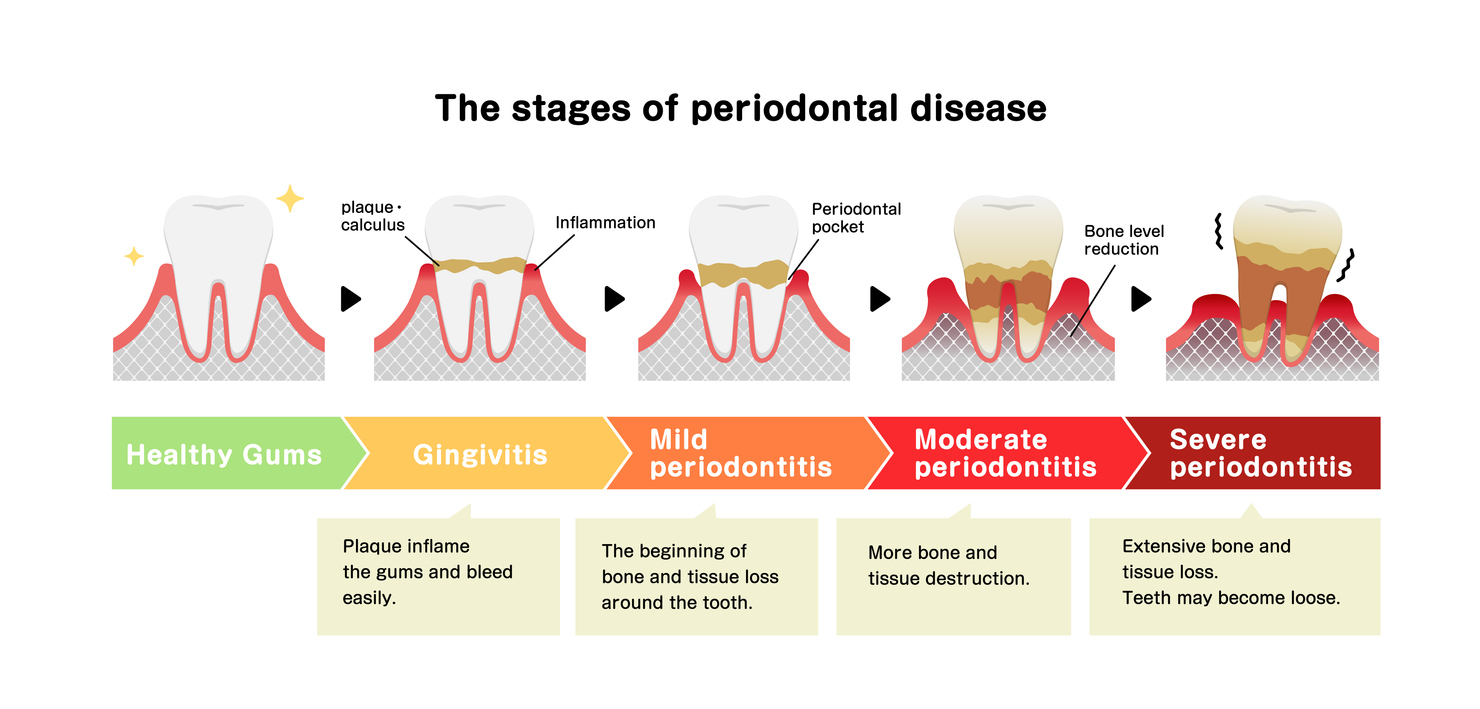Periodontal Care | Your Guide to Healthy Gums
At Intermountain Dental, we understand that maintaining healthy gums is essential for your overall oral health. Periodontal disease (gum disease) is a common condition that affects the tissues supporting your teeth, and if left untreated, it can lead to tooth loss. Our team is dedicated to helping you prevent and treat periodontal disease with the latest techniques and personalized care.
What is Periodontal Disease?
Periodontal disease refers to a set of bacterial infections that affect the tissues around your teeth, including your gums, ligaments, and bone. It typically starts as gingivitis, a mild form of gum disease, and can progress to periodontitis, a more severe condition.
Stages of Periodontal Disease:
- Gingivitis – Gingivitis is the early, inflammatory stage of gum disease. The gums become red, swollen, and may bleed when brushing or flossing.
- Periodontitis –If gingivitis is left untreated, it progresses to periodontitis, where the gum tissue pulls away from the teeth, creating pockets that harbor bacteria. This can lead to bone loss and tooth mobility.
- Advanced Periodontitis –The most severe stage, where the damage to the gums and bone may result in tooth loss. Symptoms include loose teeth, gum recession, and deep pockets between the teeth and gums.

Signs & Symptoms of Periodontal Disease
- Swollen, red, or bleeding gums
- Bad breath or a persistent bad taste in your mouth
- Receding gums
- Loose or shifting teeth
- Pain when chewing
- Gums that pull away from the teeth, creating pockets
How Periodontal Disease Develops
Step 1: Plaque Buildup
Periodontal disease begins with plaque—a sticky film of bacteria—that forms on your teeth. If not removed by regular brushing and flossing, plaque can mineralize and harden into tartar (calculus), which can only be removed by a dental professional.
Step 2: Gum Inflammation
Plaque irritates the gums, causing them to become inflamed (gingivitis). This stage is often reversible with proper oral care.
Step 3: Periodontitis
As the inflammation continues, the gums start to pull away from the teeth, forming pockets where bacteria thrive. This can lead to the destruction of the bone and tissue that support the teeth.
Why is Periodontal Care Important?
Gum disease is more than just a dental issue—it can also affect your overall health. Recent studies have linked untreated gum disease to conditions such as:
- Heart Disease
- Diabetes
- Stroke
- Pregnancy Complications
- Respiratory Problems
Taking proactive steps to prevent and treat periodontal disease can help you maintain not only a healthy mouth but also a healthier body.
Treatment for Periodontal Disease
Early detection and treatment are crucial for managing periodontal disease. Treatment options depend on the severity of the condition:
1. Non-Surgical Treatments
- Antibiotic Therapy
2. Surgical Treatments
- Flap Surgery (Pocket Reduction Surgery)
If pockets between the teeth and gums are too deep, a surgical procedure may be necessary to clean the roots of teeth and reduce the size of the pockets.
- Bone Grafting
In cases of significant bone loss, bone grafting can help regenerate lost bone tissue to stabilize the teeth.
- Soft Tissue Grafting
This involves using tissue from another part of your mouth to cover areas where the gums have receded.
3. Laser Therapy
Advanced laser technology can be used to remove infected tissue and promote healing while reducing discomfort.
4. Alternative Treatments
Tooth loss due to gum disease is a prevalent obstacle that many patients encounter at some point in their adult life. However, thanks to modern advancements in dentistry, these obstacles can readily be overcome. Traditional dentures have been the norm for those who lose all of their teeth, but today, partial dentures, bridges and implant supported dentures are all very successful options. Here at Intermountain Dental, we have effective prosthetic tooth replacements that can help you smile with confidence.
Preventing Periodontal Disease
Prevention is always better than treatment. To maintain healthy gums:
- Brush your teeth twice daily with fluoride toothpaste.
- Floss daily to remove plaque and debris between teeth.
- Use an antimicrobial mouthwash to reduce plaque buildup.
- Visit your dentist regularly for checkups and professional cleanings.
- Eat a balanced diet to support your gum health.
- Quit smoking: Smoking is a significant risk factor for gum disease.
Periodontal Maintenance
If you’re experiencing any signs of periodontal disease, don’t wait! Early detection and treatment can help save your teeth and gums. Contact us today to schedule a consultation and learn more about how we can help you maintain a healthy, beautiful smile.
